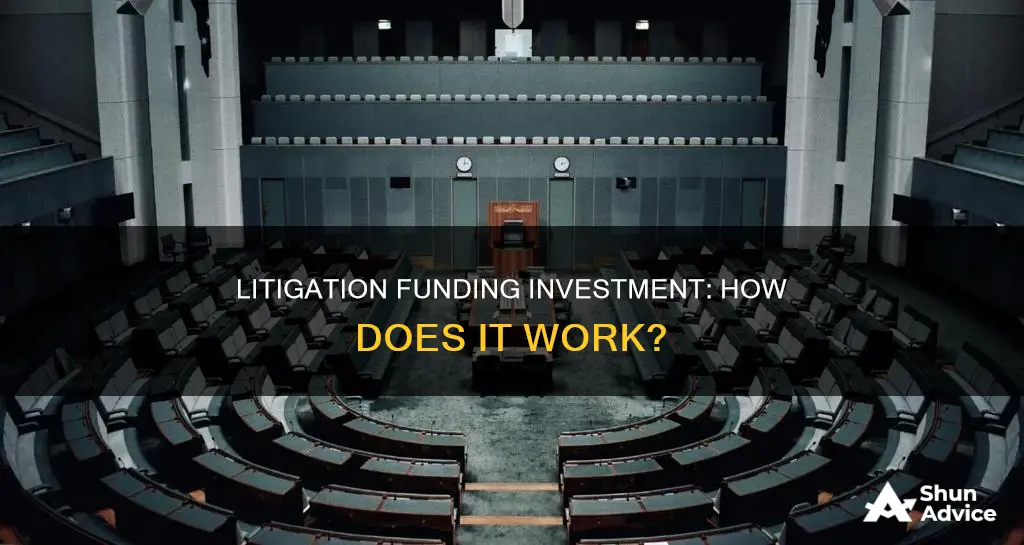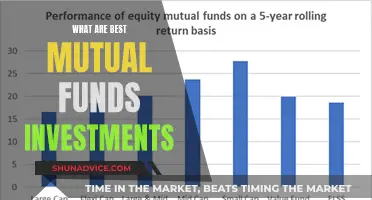
Litigation funding investment is a growing industry where investors can fund lawsuits in exchange for a share of the damages if the case is successful. If the case is lost, the investor loses their investment. Litigation funding is often pitched as a unique and exclusive investment opportunity with high returns, but it is a very high-risk investment with a potential for up to 100% capital loss. Litigation funding has been particularly prominent in mortgage audit services, where borrowers have overpaid mortgage payments due to miscalculations by mortgage lenders.
What You'll Learn

Litigation funding investment risks
Litigation funding investment is a high-risk and complex investment. The Financial Conduct Authority (FCA) considers this type of investment to be very complex and high-risk due to the potential for losses. Here are some key risks associated with litigation funding investment:
Risk of Losing the Entire Investment
If the case is lost, the investor will lose their entire investment. Litigation funding investments are typically provided on a “non-recourse” basis, which means that if the case is unsuccessful, the investor will not recover their investment. While most cases settle early, there is still a significant risk of losing the entire investment if the case proceeds to trial and results in an unfavourable outcome.
Adverse Cost Risk and Insurance Uncertainty
In some circumstances, investors may lose more than their initial investment due to adverse cost risk. After-the-Event (ATE) insurance is typically put in place for cases that carry adverse cost risk. However, it is not guaranteed that the insurance company will pay out, and there is a small chance that the investor could lose up to double the amount invested. Standard ATE insurance has conditions that may enable the insurance company to avoid paying out, such as if there is claimant misrepresentation or solicitor negligence.
Lack of Protection and Difficulty Retrieving Investment
Investors are unlikely to be protected by the Financial Services Compensation Scheme (FSCS) or the Financial Ombudsman Service (FOS) if something goes wrong. Additionally, it can be challenging to retrieve the investment early by selling it in a secondary market, and there may be exit fees or additional charges associated with early withdrawal.
Complex and Opaque Nature of Investments
Litigation funding investments are complex and based on other risky investments, making it difficult for investors to know where their money is going and to predict the level of risk accurately. The lack of transparency and mandatory disclosure in litigation funding agreements has raised concerns about potential conflicts of interest and undue influence by funders.
Delayed Returns and Long-Term Nature of Investments
Returns on litigation funding investments are dependent on the outcome of the case, which may take months or years to conclude. Investors should be prepared to hold their investment until the conclusion of the litigation. Litigation funding investments are long-term commitments that could take several years to yield a return, and there is no guarantee of investment returns.
Impact on Plaintiffs and the Legal System
Litigation funding can result in plaintiffs receiving reduced recoveries after attorneys' fees and funders' cuts are deducted. It may also incentivise the filing of non-meritorious litigation and prioritise profit over justice, potentially undermining the fairness and integrity of the legal system.
National Security Risks
The lack of transparency and mandatory disclosure in litigation funding has raised concerns about national security risks. There are no measures in place to prevent foreign adversaries from using litigation funding to circumvent existing safeguards and gain access to sensitive information or influence the legal system.
Liquid Funds: A Smart Investment Move?
You may want to see also

Litigation funding insurance
Litigation funding is a growing industry, especially in the UK, where it has been gaining prominence since 2013. Litigation funding involves a specialist funder financing some or all of a claimant's legal fees in exchange for a share of the damages if the case is successful. If the case is lost, the funder loses their investment.
One example of litigation funding insurance is Full Capital Protection Insurance. This type of insurance provides absolute protection for the full amount invested. If a case that has been funded by an investor goes to court and is lost, the litigation funder will make a claim on the investor's behalf, and the investor will receive their full investment back within about two weeks.
In the case of Allansons / Mortgage Audit Services litigation funding, investors are promised to get their money back if the cases fail via After The Event (ATE) insurance provided by Leeward Insurance of Bermuda. However, it is important to note that this investment is not covered by the Financial Services Compensation Scheme (FSCS). While some unregulated third-party introducers have promoted it as such, Allansons / MAS's literature states that it is not covered by the FSCS.
When considering litigation funding as an investment opportunity, it is essential to carefully evaluate the risks involved. While litigation funding can offer potentially high returns, there may be hidden risks, and it is important to be cautious of opportunities that seem too good to be true.
Recovering from Security Fraud: Getting Your Money Back
You may want to see also

Litigation funding success fees
Litigation funding is a growing business, with more than 25 established funders in the market. In its simplest form, litigation funding involves a specialist funder financing some or all of a claimant's legal fees in exchange for a share of the damages. If the case is successful, the funder will recover their investment plus a success fee. If the case is unsuccessful, the funder loses their investment.
Success fees are a broad term for an agreement between a client and a solicitor, where the payment of the solicitor's fee is contingent on the success of the case. The term ""no win, no fee" is a commonly used phrase to describe this type of agreement. Success fees can be divided into two categories: speculative fee arrangements and damages-based agreements.
Speculative Fee Arrangements
Under speculative fee arrangements, if a case is lost, the solicitor will not recover their fee. However, if the case is won, the solicitor's fee, plus an uplift, will be recovered from the other side. This uplift is the "success fee", and it is payable by the client. In speculative fee arrangements, this uplift is limited to 100% of the fee recovered from the other side.
Damages-Based Agreements
The solicitor's fee is calculated as a percentage of the damages recovered in damages-based agreements. If no damages are recovered, no fee is payable. This type of success fee has gained popularity, especially since solicitors in Scotland have been allowed to enforce such agreements.
Litigation Funding Investment
Litigation funding investment is when a third party, usually a specialised funding company, a private equity firm, a hedge fund, or a private or listed company, funds some or all of a claimant's legal fees in return for a pre-arranged percentage of the damages obtained from the losing party. If the claim is unsuccessful, the funder loses their investment and has no recourse against the claiming party.
Example of Litigation Funding Investment
An example of litigation funding investment is when an investor funds litigation cases specific to a breach of mortgage contracts. In this case, borrowers have overpaid their mortgage payments due to miscalculations by mortgage lenders. The investor funds the legal fees, and in return, they receive a share of the damages awarded to the claimant if the case is successful.
Maximizing TFSA Investments: Strategies for Smart Financial Planning
You may want to see also

Litigation funding market growth
Litigation funding, or legal financing, is a process in which a third party provides financial assistance to solve costly litigation or arbitration cases. In exchange for a share of the damages, a specialist funder finances some or all of a claimant's legal fees. If the case is successful, the funder will recover their investment plus a success fee; if the case is unsuccessful, they will lose their investment.
The litigation funding market is expected to experience significant growth and maintain its dominance during the forecast period. This growth is driven by several factors, including:
- Increased awareness and understanding of third-party financing: A survey by OmniBridgeway found that two-thirds of CFOs and senior finance professionals were "very likely" to use litigation finance in the next two years.
- Surge in capital investments: The increased understanding and utilization of litigation financing have led to massive growth in capital investments, which fuel market growth.
- Rise of emerging economies: The growth of economies in nations like India is expected to impact the market as they create or amend legislation to make the legal procedure more accessible and predictable.
- Growing legal disputes: As the corporate landscape becomes more complex, organizations and individuals find themselves involved in a broader spectrum of legal disputes, including complicated economic issues, intellectual property problems, and large-scale class-action litigation.
- Supportive regulatory framework: The presence of a favourable regulatory framework for lawsuit financing, as well as the growing presence of litigation funders in several nations, is contributing to market growth.
- Increased number of litigators: Up-and-coming litigators are recognizing the importance of litigation funding as an increasingly influential factor in the market.
However, the market growth also faces challenges, such as the non-acceptance of third-party funding as a form of alternative dispute resolution and the lack of regulation in terms of fees and interest. Additionally, the high risk of returns coupled with unpredictability and concerns about potential conflicts of interest are constraining factors.
How Real Estate Investment Fund Managers Make Money
You may want to see also

Litigation funding case studies
LexShares
LexShares has published a list of case studies on its website, detailing the types of litigation funding it provides. Here are some examples:
- Breach of Fiduciary Duty: A professional athlete filed a case against a financial advisory firm for breach of fiduciary duty.
- Business Squeeze Out: Minority business owners took legal action against a management group, alleging a squeeze-out.
- Misappropriation of Trade Secrets: A technology company took on a Fortune 500 company over the misappropriation of trade secrets.
- Qui Tam Whistleblower: A whistleblower, alongside the United States, took on a Fortune 1000 company.
- Breach of Contract: A former executive sued a real estate investment firm for breach of contract.
Woodsford
Woodsford, a litigation funding company, has shared case studies highlighting their experience in holding big businesses accountable and facilitating access to justice. Here are some of their notable cases:
- Holding Big Tech to Account: Woodsford provided funding to a debtor to pursue valuable claims against a tech giant.
- Holding Airbus to Account: Woodsford offered financial support to a technology innovation company in its pursuit of claims against Airbus.
- Class Action Against AMP: Woodsford funded a class action against AMP, a pension fund in Australia, for overcharging superannuation members on administration fees.
- Global Portfolio Financing Facility: Woodsford provided funding for a global portfolio financing facility, demonstrating their ability to handle complex financial cases.
- Commercial Arbitration Funding: Woodsford financed a CAT claim against a car shipping cartel, showcasing their support for anti-competitive behaviour cases.
Harbour Litigation Funding
Harbour Litigation Funding has been involved in several notable cases, although many of them remain confidential. Here are some of the public cases they have funded:
- Class Action Against Ford Motor Company: Harbour supported a class action against Ford regarding allegedly misleading fuel consumption representations in the sale and leasing of vehicles.
- Claim Against Bank of Asia: Harbour funded a claim by a senior banking executive arising from disputed shareholdings of the Bank of Asia.
- Class Action Against Hiscox: Harbour provided funding for a class action against Hiscox due to their refusal to pay claims made under business interruption insurance policies.
- Class Action Against RBS: Harbour financed a case brought by 6 large shareholders against RBS regarding untrue or misleading statements in its investment prospectus.
- Claim Against Kazakhstan Kagazy: Harbour funded a claim by Kazakhstan Kagazy against its former directors and shareholders due to a large-scale fraud revelation.
MoneySavingExpert Forum
A user on the MoneySavingExpert forum shared their experience with an investment opportunity in litigation funding. The investment involved funding "no win-no fee" court cases where borrowers had overpaid mortgage payments due to miscalculations by mortgage lenders. The potential yield was advertised as 5% of the award and 30% of the base legal fees, with a minimum investment amount of £4,000. While the returns looked attractive, other forum members warned about potential hidden risks associated with such investments.
Bond Funds: Best Time to Invest and Why
You may want to see also
Frequently asked questions
Litigation funding investment is a specialist funder that finances some or all of a claimant's legal fees incurred in a dispute, in exchange for a share of the damages.
If the case is successful, the funder will recover their investment plus a success fee.
If the case is unsuccessful, the funder will lose its investment.
The litigation funding market has been growing in prominence in recent years, with more than 25 established funders offering diverse products.
The mainstream market caters to high-value cases where the cost/damages ratios are estimated to be at least 1:10. There is a limited market for smaller matters, provided the damages are sufficient to cover the funder's investment and success fee while leaving a significant portion for the client.







